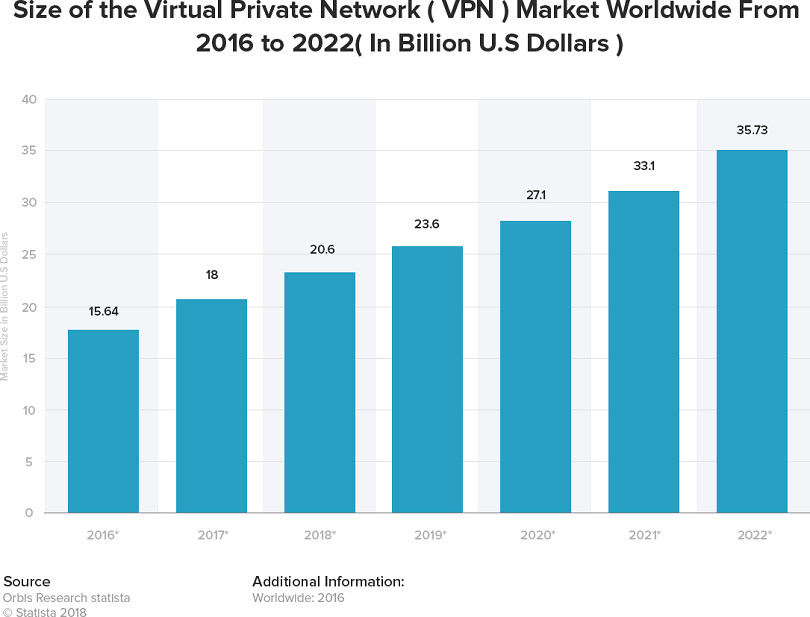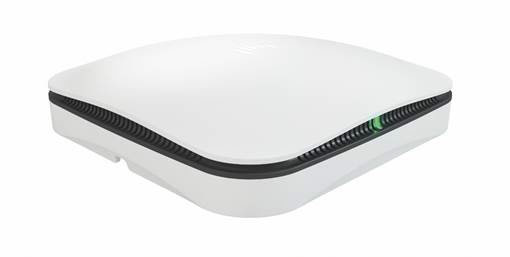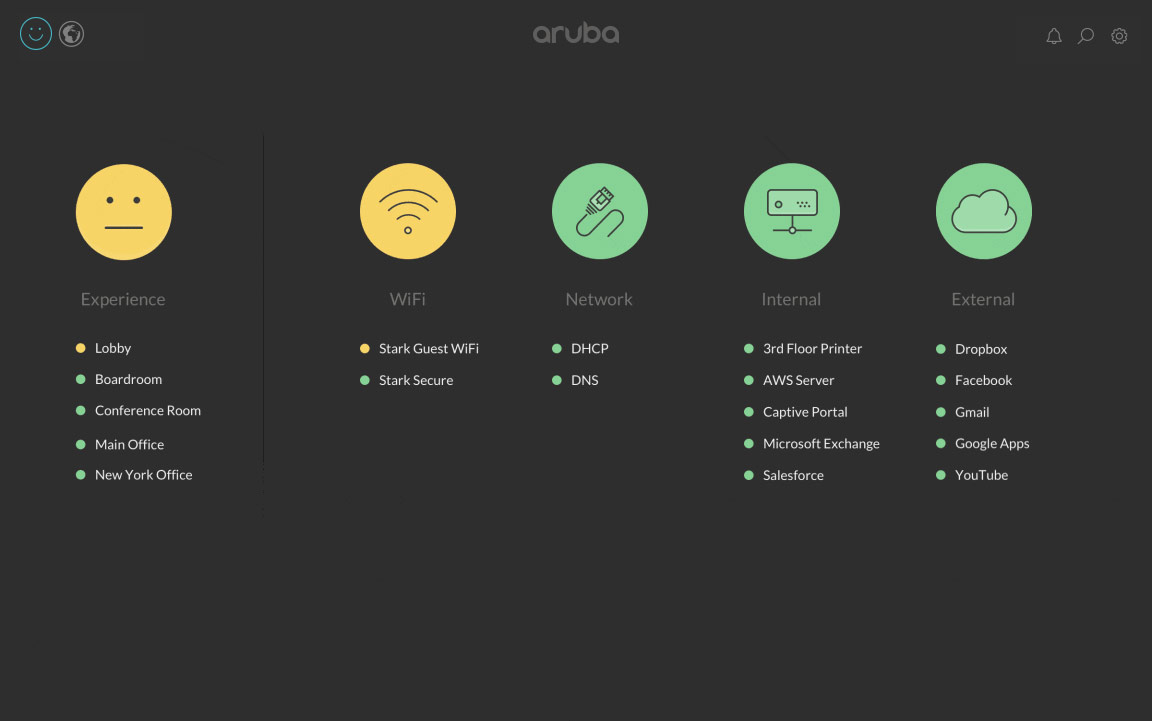What VPN services are a Good Fit for you?
I am certain that many people are familiar with the concept of a VPN or virtual private network. They are used to gain access to a corporate network while traveling or at home. I would assert though that few are familiar with the growing market of personal VPN providers who target non-commercial entities and individuals.
According to Orbis research Statista:
This market has grown eight billion dollars in the past five years
and is expected to grow another twelve billion in the next three years.
This emerging market has many players. Understanding which to use can be quite confusing to someone who is not well informed on the topic.
We will explore the concepts of how they differ from the often-provided corporate VPN’s. As well as discuss how to use them to protect your private information aside from how the company protects itself.

Corporate vs. Personal VPN
Most business travelers do utilize corporate VPN connections to gain access to company files and services. When the traffic is not destined to the business networks, the traffic is not tunneled back to the home office. This configuration is called split tunneling.
It is a very common configuration. Network engineers configure this so that users will not saturate the VPN concentrators with YouTube, Netflix and other non-business-related traffic. Additionally, as business travelers it is incumbent on us to use company assets such as bandwidth in a manner which is in line with our companies’ policies.
How do the personal VPN services work?
Most if not all personal VPNs use a client-based software to encapsulate and encrypt the traffic. This makes it very hard to unscramble if someone is capturing data from an open network.
The other mechanism used is to proxy the traffic to a third party where it is then sent to the eventual destination. The proxy or redirect mechanism ensures that the transmitted information doesn’t contain the public IP of the coffee shop or public network but the source IP address of the proxy service. This is important when connecting to financial institutions that monitor the public IP address that you normally connect from.
If for some reason another person attempts to connect to your bank account through the bank’s web portal, the bank would notice that it is not the normal public IP address that you would typically connect from and disallow the login attempt.
Who are they for?
Firstly, who should use a personal VPN? The answer is anyone who regularly uses free and open Wi-Fi at public places. Anytime you connect to the coffee shop Wi-Fi or to a hotels guest network connection, you are often at risk of someone intercepting the unencrypted traffic you are sending and receiving. This vulnerability has existed for many years and is called a, “man in the middle attack”.
This sort of intrusion used to be carried out by very skilled hackers but these days the attack is very well documented. Toolkits to exploit these common scenarios are being used by very unskilled characters.
Personal VPNs circumvent the vulnerabilities of open networks by using encapsulation and traffic proxying so that the connection is more secure and free from prying eyes.
Good rules to live by regarding when you should use a VPN include:
- Are you logging in to a private or personal account of any kind?
- Are you transmitting information that is proprietary?
- Is there personal or customer information being transmitted?
- Is banking or financial information being received?
If any of these conditions exist, I would recommend using a personal VPN to protect yourself. The many protective and anonymizing mechanisms that the VPNs employ would allow you to safely transmit and receive any data without the risk of intrusion.
Current major players in this market
I will not make any direct recommendation since at Zunesis do not sell these products directly. We can help with the implementation of them if requested. I would recommend that you find a solution that does satisfy the conditions I have covered.
This article from PCMag.com gives a great overview of how VPNs work and how each VPN company compared to the others.
How can Zunesis help?
At Zunesis, our expertise and offerings focus on corporate VPNs and other firewall services. We find it equally important that our clients and partners understand the risks involved when not utilizing some protective measures when they connect to open public Wi-Fi systems.
We have all heard of the unlucky Hollywood stars who have had their personal accounts targeted or hacked at great expense to themselves. Reputations are very important in business and in private life. Remember that the weakest link is not the traffic we monitor, it is the traffic we do not.
End User-Centric Network and Application Performance Analytics
Increasing reliance on Wi-Fi for Enterprise and IoT applications mean IT departments are facing new challenges to deliver the best user and client experience possible. To provide a consistent level of performance, the Aruba Service Assurance solution enables IT to proactively simulate real-world user and client experiences.
IT can continuously monitor network connectivity and the performance of wireless and Ethernet connections in critical, high-value locations like office spaces, retail, education, healthcare, and similar types of environments.
How it works
The Aruba Service Assurance solution includes simple to deploy sensors, cloud-based data processing and an easy to learn web-based administrative dashboard. It can be accessed from anywhere using either Chrome or Safari browsers.
It’s a great tool for any organization and IT team tasked with delivering the best possible network experience with their user’s connectivity and app performance in mind – especially the “C-suite” or users with cyclical problems reported to the help desk.
Components to the Solution
Purpose-built Sensor
Aruba LTE sensors can be placed within any area where users or IoT devices are located to reduce the time to identify and resolve application responsiveness and user experience issues. The sensor is placed at the same height where user’s devices are placed or held, to run accurate simulated tests over Wi-Fi. Wired connections are also supported.
Tests can be set up for LAN and WLAN connectivity, DHCP, DNS, authentication, captive portal response, cloud and internal applications. Installation of the sensor, even in extremely remote locations is easy due to built-in out-of-band cellular connectivity. This reduces the time and effort normally required to go on-site, diagnose a problem and put a resolution into action.

Configuration and visibility: Web-based dashboard
The cloud-based analytics and insights engine provides a robust and scalable model that allows IT to centrally configure and run tests for today’s cloud-based (SaaS) or internal applications. Pre-configured templates or custom defined tests can monitor the most important apps and services. For example, tests can automatically ping a server to confirm responsiveness, or run a script through a browser to see how an application is performing before users encounter a problem.
The web-based service assurance dashboard is designed with simplicity and one-glance visibility in mind. It changes how an assurance dashboard should work. A unique, five-column traffic light model easily lets you see when things are working great and when they’re not.
The status of each sensor, SSID, service and application being tested are highlighted under each of the traffic light icons. This provides IT a good understanding of overall user experience, Wi-Fi connectivity and quality, responsiveness of core network services, and the reachability of internal and external services. Smart notifications can be setup to keep you informed on your mobile device.

How can Zunesis help?
Zunesis is an Aruba Platinum partner, which is the highest level of achievement. We can help any customer or prospective customer on even a small project with a concern such as we have outlined in this post.
A simple deployment of a single sensor and a 1 year subscription to the data and analytics gathering would cost only about $1200. Zunesis can install a quick test solution for our clients who need to get to the bottom of a tough end-user experience issue through our unique Customer Connect Program. This program provides 2-3 hours of no-cost onsite consulting with customers.
For instance, we could use that time to setup a basic Service Assurance sensor and dashboard. We then provide another hour or two of time after deployment to work with the client on reviewing results of the data gathering.
Plus for that small cost, the sensor is available to use for other testing, and one would simply need to renew the annual service subscription (or purchase up to 5 years up front!).
More Information:
Aruba Networking Service Assurance

